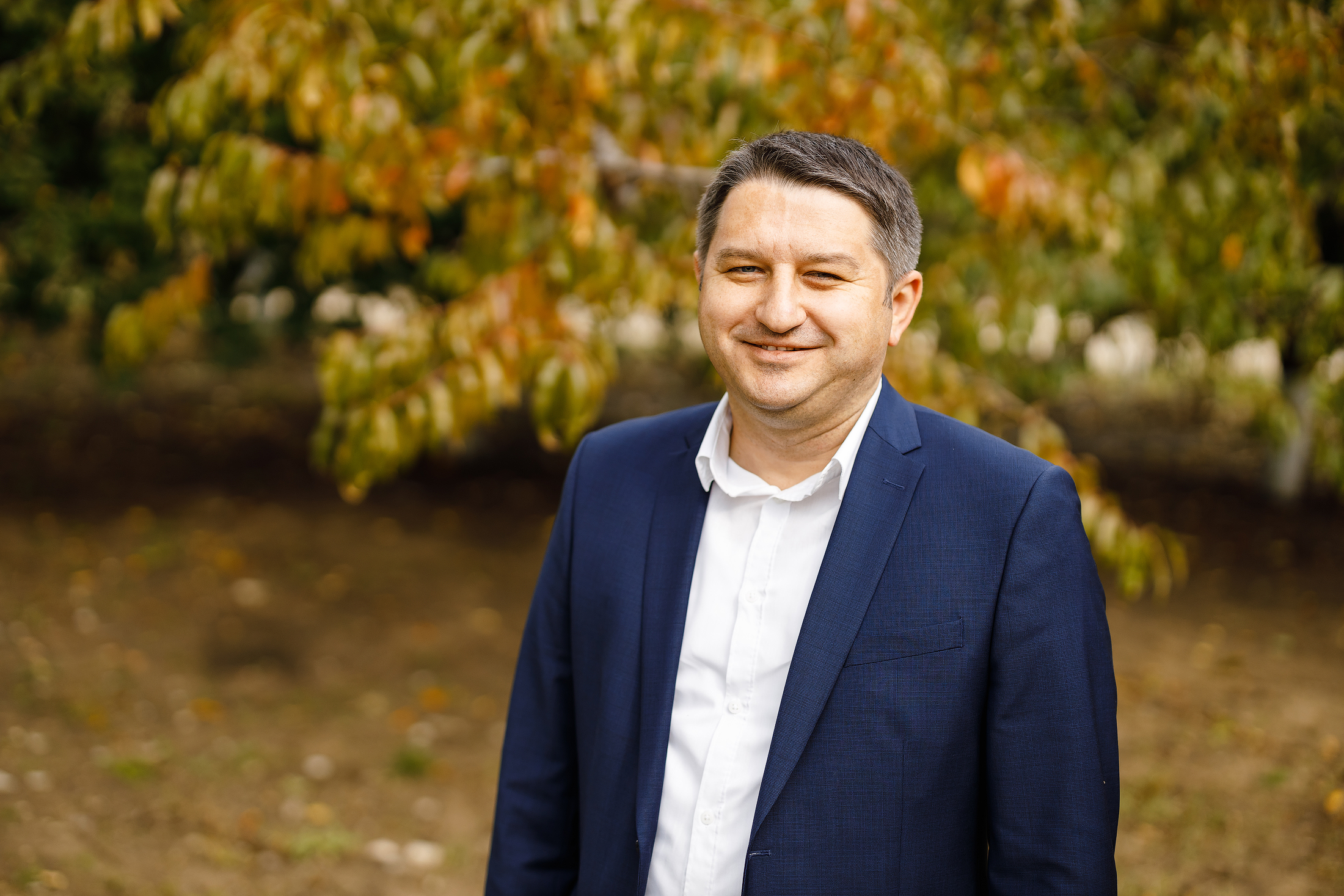MSMEs need accessible financing tools to become more competitive
September 29, 2022

The Bonaro Agro Grup company from the village of Parcani, Șoldănești district applies the technologies in the production process of providing a grant offered by Sweden and the United Kingdom within the UNDP project "Advanced cross-river capacities for trade"
Micro, small and medium enterprises (MSMEs) are the backbone of the economy of the Republic of Moldova, accounting for 98% of all companies and providing 6 out of 10 jobs.
UNDP Moldova appreciates the contribution of MSMEs and startups to the national and local economy by directing its efforts to supporting them in overcoming the challenges they face – the difficulty in attracting and retaining qualified staff, accessing capital for maintenance and development, and in accessing foreign markets.
In terms of financing, bank loans remain the go-to option for MSMEs, an option that sometimes simply does not work. This is why alternative financing tools are needed.
What can we do to facilitate their access to financial resources? We addressed this question to Andrei Darie, Program Specialist and Team Leader/Inclusive Growth at UNDP Moldova and Inga Snegur, Sales and Development Specialist at Fagura, a company that benefited from a grant of US$34,050 from the UNDP programme “Acceleration digital transformation in public sector in the Republic of Moldova” to launch a lending mechanism for MSMEs and startups. Moreover, the first 50 beneficiary companies will receive loans with zero interest rate.

Andrei Darie, Program Specialist and Team Leader/Inclusive Growth at UNDP Moldova
What are the biggest challenges for small businesses and startups in Moldova? Why should they be supported?
Andrei: MSMEs in the Republic of Moldova can contribute significantly to the national economy, which will be reflected in the well-being of the population. In addition to the advantages that MSMEs have, they are also vulnerable, having fewer human and financial resources. MSMEs need a favourable business climate, well-established business development services, but also financing, to put into practice the innovative ideas they have and create more competitive products or services.
Inga: The biggest challenge for small businesses in the Republic of Moldova is the lack of access to finance. Usually, young people have great and even useful ideas, but they don't have enough financial resources to realize them. When they end up looking for investors or liquidities at the bank, they are usually asked for guarantees, which only a profitable company or a company with a positive credit history can have. The biggest asset of a small business, in fact, is its critical thinking and will to create something useful and new.
Andrei: We need to acknowledge that the Republic of Moldova has reduced the administrative burden on MSMEs by simplifying business licensing procedures, halving the number of organizations with inspection rights, and simplifying reporting requirements. At the same time, financing capacities of the Government, but also of the financial sector, have increased. However, several evaluations, including the UNDP study “Mapping of financing instruments and practice for MSMEs in the Republic of Moldova”, conducted in partnership with PwC, show that we need to accelerate institutional and regulatory reforms to “fertilize that soil” that is necessary for MSMEs development.
According to the study you mentioned, every 2 out of 5 Moldovan companies declared that they are ready to take a loan from the bank. However, 3 out of 5 would not use this option. How do you interpret these perceptions?
Andrei: In Moldova, bank loans come at a very high price to the MSMEs. To be able to repay them, but also to bear the costs necessary to run the business, companies should be extremely productive. Another factor is the obligation to cover the borrowed amount with collateral, often non-existent, especially in the case of startups.

Inga Snegur, Sales and Development Specialist at Fagura
Inga: When you arrive at the doorstep of a financial institution, there is a long list of documents, well-defined financial data, and collateral in the form of real estate or at least movable property that are usually required, so that the company can qualify for a loan. Such demands usually either challenge you or turn you away. Only a few companies manage to get a loan. If we talk about the newly created companies, most of the time, only a few hundred thousand Moldovan lei is what they need for their idea to come to life.
The same UNDP study, mentioned above, finds that women SME managers face difficulties when trying to access loans and that the top applicants for loans are companies from rural areas. How do you comment this data?
Andrei: The study finds that women in business experience great pressure. Women managers are more reluctant to accept a higher cost of bank loans (42.8% women versus 36.2% men), which would mean better coverage of financial risks. This leads to a lower success rate of women-managed companies in obtaining bank loans compared to men-managed companies (57% of women-managed companies versus 79% of men-managed companies). At the same time, in rural areas, bank loans are often the only available financial instrument.
Inga: Our data also confirms that rural business is at the top. And of the first MSME loans, financed through Fagura, were given to women-led companies. Moreover, a good part of our customers is from the north of Moldova, which makes us even happier. Taking into account the global trend of promoting eco-friendly businesses, eco-products and those made from recyclable materials, we proposed that on the Fagura platform we would like to support these initiatives, so to accelerate development.
What financing opportunities do Moldovan SMEs have?
Andrei: Bank loans are the main source of financing, followed by those offered by the non-bank micro-financing organizations (micro-lending companies, leasing companies, savings and loan associations etc.). This is also reflected in the size of the two sectors of the financial market – MDL53.3 billion (banking sector) versus MDL11.7 billion (non-banking sector). However, competition with the non-banking sector leads to greater flexibility in banks' lending policies, but also to a willingness to accept greater risks to withstand the competition.
Which companies require the most investment? What are the trends in the market?
Inga: Currently, the maximum amount of financing offered by Fagura is €5000. Thus, we tend for the first 50 loans to be offered, mostly, to startups and micro companies. We believe that these are precisely the companies that need the most support. We tend to support various types of companies. The usual request is replenishing the stock of goods or procuring a car for the business – the most common purpose mentioned by entrepreneurs who submit requests through our platform.
What is the solution for MSMEs that you developed with the help of UNDP Moldova?
Inga: UNDP Moldova helped us develop the Fagura platform and to implement the zero-interest loans programme from a technical perspective (developing the web page), but also from a procedural perspective. Thus, the first 50 eligible companies that will apply through our platform will not only get a loan easier (than they would if they went to a bank) but will also benefit from interest compensation.
How did you create the company selection algorithm? What are the selection criteria?
Inga: Anyone can apply for the programme, regardless of the type of activity. But since they apply through the platform, there is an automated scoring system, and there are lending specialists who undertake a more thorough analysis. The internal score is calculated based on several data: financial situation, credit history, assets, period, and requested amount etc. The founders/administrators of the company matter a great deal as well. After funding, we also monitor how the money is used. I would like to point out that the whole process happens online, and this way we also inspire our customers to go digital and prove that they can raise funds without wasting their time in queues or dragging stacks of papers along. What inspires us the most is the fact that this way the community wins, and small entrepreneurs get to develop.
How does UNDP contribute to improving the MSME financing climate in Moldova? How does UNDP support the private sector in its efforts to access funds?
Andrei: Access to financing is an essential precondition for the technological development of MSMEs, increasing their productivity and performance, and supporting exports. UNDP Moldova is working to improve the institutional and regulatory aspects of the problem, by facilitating the public-private dialogue at the local and regional level, but also by strengthening the advocacy capacities of business associations.
Also, MSMEs and startups can often find funding opportunities at UNDP, in the form of non-reimbursable grants, which are offered to increase the competitiveness of SMEs. This assistance often is used to procure equipment and services, and generally, improve the infrastructure of an enterprise.
"The nature of UNDP's efforts is catalytic; we look to improve the institutional and legal framework, to make it as favourable as possible so that new MSMEs financing instruments are available to all micro, small and medium enterprises in the country.”Andrei Darie, Program Specialist and Team Leader/Inclusive Growth at UNDP Moldova

 Locations
Locations